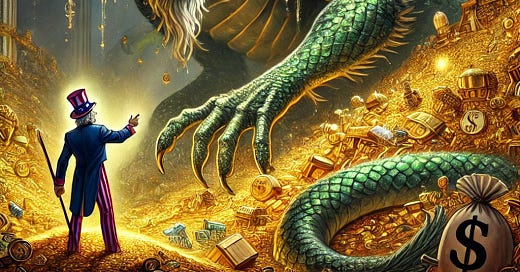The Supreme Court Accidentally Made the Case for Taxing Billionaires Out of Existence
A state that values its continued existence must take steps to ensure that no single individual accumulates the power to dismantle it
When the Supreme Court ruled in Citizens United v. FEC that money is speech, they didn’t just open the floodgates for corporate spending in elections. They justified the elimination of billionaires. The Court has long held that free speech can be limited when it deprives others of their right to speech. If money is speech, then the hoarding of money is a threat to free speech when it allows one person to deprive citizens of their right to self-government.
This is not a critique of capitalism as a method of distributing resources. Markets are an efficient tool for organizing production, rewarding innovation, and allocating investment. But markets, like any system, have inefficiencies—places where their logic breaks down and require correction. And if government cannot intervene when wealth accumulation allows one person to dictate the terms of democracy, then it has already forfeited its power to intervene not just in this case, but in all future cases where market inefficiencies are harming its citizens.
This isn’t a matter of fairness. It isn’t even about economic justice. The hoarding of wealth allows one person to accumulate the power to deprive everyone else of their right to self-governance just as surely as any occupying power who defeated us on the field of battle. The Supreme Court has already recognized that speech can be restricted when it undermines democracy—fraud is not protected speech, nor is inciting violence, nor is disrupting the functioning of government itself. But since Citizens United, billionaires have been allowed to use their money—their speech—to seize control of elections, dictate policy, and dominate public discourse.
This is not democracy. This is occupation by another name.
Other Great Powers Have Already Recognized the Threat
China has spent the past decade methodically dismantling its billionaire class—not as an economic measure, but as a means of preserving the state. The government recognizes that the state must protect itself in order to continue. Jack Ma, once China’s richest man, was celebrated as a symbol of the country’s economic rise. Then he criticized government regulators in a speech. Within months, he vanished from public life. His company was broken up. His influence was erased. Other billionaires, from Cheng Wei to Wang Jianlin, suffered similar fates. They had accumulated enough wealth to challenge the state. And so the state crushed them.
Russia operates on the same principle, though it is more direct in its methods. The oligarchs exist at the pleasure of the Kremlin. Those who overstep their bounds, who attempt to wield power independent of the state, are exiled, imprisoned, or executed. Their wealth is not their own. It is a privilege granted to them by the state, revocable at any time.
The United States is not China or Russia. We should not emulate the harshness of their methods or their disregard for individual rights. But if the United States is unwilling to defend itself from enemies foreign and domestic, the rules of the future will be set by rivals who are. Those rivals recognize that the hoarding of private wealth is a form of power, and neither will tolerate it as a challenge to the state. America, meanwhile, allows billionaires to function as a ruling class, writing the laws that preserve their own dominance.
And perhaps it will not be Moscow or Beijing that sets the rules of the future. Perhaps it will be something even more cavalier in its contempt for human rights, something unconcerned with the illusion of national identity or stability, something that exists only to perpetuate its own power. A private order, a state in all but name, unaccountable to any electorate and beholden to nothing beyond its own wealth. That is the logical endpoint of a government too weak to regulate its own economy—a world in which the future is shaped not by nations, but by the unchecked whims of the ultra-wealthy, an aristocracy that owes no allegiance to anything beyond its own perpetuation.
A Nation That Allows Billionaires to Rule It Has Already Been Defeated
A government that cannot act in its own defense is not a government. The Supreme Court has already acknowledged that free speech can be limited when it disrupts democracy or deprives others of their rights. The government does not just have the right to intervene—it has the obligation. If money is speech, then hoarding money is the monopolization of speech. And if monopolizing speech can be restricted to protect democracy, then extreme wealth accumulation must be treated the same way. The government should not just tax billionaires more. It should tax them out of existence. It should break up their monopolies, seize their political assets, and dismantle the system that allows them to dictate the terms of American life.
A state that cannot regulate its economy will not remain a state for long. If the government refuses to act, it will not be the American people who write the future, nor will it be their elected representatives. The laws of tomorrow will be written by whoever is strong enough to impose them—by Beijing, by Moscow, or by something even worse. A country that refuses to defend itself from oligarchs is a country that has already surrendered. A government that will not rule itself is one that has chosen to be ruled.





America’s plot thickens.
Money hoarders untaxed and unregulated will either be the downfall of this country or they will be the impetus for one very mighty sea change. Elon Musk and all the others could go down in history for going too far and plunging their ilk into oblivion.